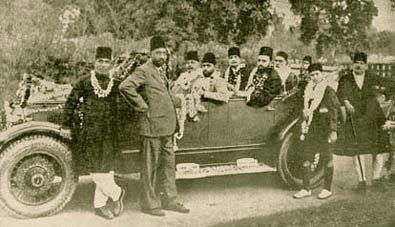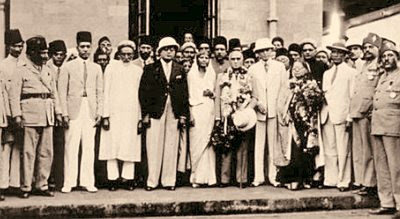Today’s edition of the Norwegian newspaper VG published an essay by Fjordman. The text, however, had been significantly redacted by the editors of VG without the author’s consent. To set the record straight, the complete article is reproduced below in English, followed by the original Norwegian.
Just as we did several weeks ago, we aim to overcome the stifling censorship imposed by the Norwegian media by spreading this essay as widely as possible. To help the cause of free speech, please mirror it on your blog or website.
We intend to demonstrate once again to the Norwegian newspapers that we can reach a wider readership than they can.
 Introductory note from Fjordman:
Introductory note from Fjordman:
This is my most recent Norwegian article as it should have appeared in print. Today VG, the largest national newspaper in Norway, published this article in the paper edition, but they also cut out a couple of vital paragraphs without my knowledge or approval. My essay was not over-long, and I stayed within their normal limits.
The missing paragraphs referred to the fact that Mohammed had sex with a nine-year-old child (Aisha) and that modern Islamic theologians such as Yusuf al-Qaradawi support this policy today because it is a part of Mohammed’s Sunna, his personal example. Journalist Elisabeth Skarsbø Moen and others deleted this, accidentally-on-purpose. They also deleted my suggestion that NRK TV dare not show a drooling Yusuf al-Qaradawi in a wheelchair telling Muslims that pedophilia is OK, in contrast to the parody of me they have been broadcasting.
Why did they cut this out? Fear, plain and simple.
I composed this essay in response to Anders Giæver, who writes regular commentary for VG and has slimed me several times for my alleged “paranoia” about Islam and Muslims. So VG can harass me for having paranoia about pro-Islamic censorship, and when I reply they censor me with pro-Islamic censorship.
 Fjordman Lives On
Fjordman Lives On
by Peder Jensen, also known as Fjordman
Translation: Cecilie, aided by Fjordman.
A commentator at VG (Verdens Gang, Norway’s largest national newspaper), Anders Giæver, has attacked me multiple times in his columns in that newspaper. On the one hand he describes me disdainfully as an average Norwegian, but also adds that I am “one of the most central promoters of Islam-hatred and Muslim-paranoia in Europe.”
Who has decided what constitutes paranoia? Mr. Giæver has read hardly any of the writings of Bat Ye’or about Eurabia, nor Robert Spencer’s website Jihad Watch, and has probably not understood what little he may have read. He is incapable of disproving a single factual piece of information I have published, nor my statement about Islam being impossible to reform or fit in with Western civilization. The only thing he has to show for himself, therefore, is personal attacks.
It is true that after the terrorist attacks of July 22nd I was exhausted. When I appeared in VG under my real name I seriously contemplated giving up my career as a writer. However, after the situation has calmed down a bit and I could think things through, I have decided to continue with undiminished force.
Right from the beginning I have been saying that terrorists, whether they come in the shape of Islamic Jihadists or Anders Behring Breivik, should not be allowed to decide what a free society can or cannot discuss, and I meant that. If that is the case, they should not to be allowed to dictate to people who are critical of Islam and mass immigration, either.
I will definitely not accept that the mass media should be allowed to threaten or harass me to make me shut up.
If one day I should stop my activities it will be through my personal choice, not one dictated by Anders Giæver, Marie Simonsen or other media bullies.
In its ethical guidance the “Vær Varsom” (“Be Careful”) poster, the Norwegian Press Association gives a person the right to reply to statements uttered about him in the press. I will in the future actively exercise this right, which means I will be more visible than ever.
If Norwegian newspapers refuse to publish my essays I will publish them on the Internet at Gates of Vienna, both in English and in Norwegian, as examples of press censorship. My book The Curious Civilization will also be published as planned in 2012.
The Islamic Council of Norway, which is coercively sponsored by native, non-Muslim Norwegian taxpayers, receives guidance from the European Council for Fatwa and Research about whether they should be for or against the death penalty for homosexuals.
The Council is headed by Yusuf al-Qaradawi, who is the spiritual guide of the Muslim Brotherhood. Qaradawi has among many other things boasted openly that Muslims will soon conquer Europe, and has praised the Nazi Holocaust.
Representatives for Jonas Gahr Støre’s Ministry of Foreign Affairs have met members of the Brotherhood for talks in Oslo.
The author Walid al-Kubaisi describes al-Qaradawi as being “more dangerous than bin Laden” and describes how he issues fatwas ruling that it is allowed (halal) to marry children. I refer to the article “Islam and marriage with minors.” Muhammed himself married Aisha when she was only six, and consummated the marriage when she was nine and he was 54 years old (Bukhari 7.62.64). This has become part of his Sunna, or personal example, to be followed for all time.
In February 2006 a delegation was sent from Norway to the Middle East to beg for mercy from the mighty Yusuf al-Qaradawi because of the Mohammed cartoons. This was supported by the Norwegian government of PM Jens Stoltenberg.
Qaradawi then demanded a legal ban on criticism of Mohammed, the founder of Islam. This would imply submission to sharia law and that Europe and the Western world would from now on be under Islamic rule. That is what the international conflict over the Danish cartoons was really about.
Thomas Seltzer, a host of NRK3, has shown a caricature of me as a paraplegic writer in a wheelchair. I suppose this makes me Norway’s answer to Stephen Hawking, which I take as a compliment. Alternatively, one could be lead to believe that people in wheelchairs are slavering idiots, which is not particularly tasteful.
The difference between a humorist and a bully is that a true humorist makes fun of the powerful, not the weak. Seltzer does not dare to show a drooling Qaradawi in a wheelchair telling Muslims that pedophilia is OK.
I don’t take this very personally, given that Mr. Seltzer can scarcely be taken seriously. However, it does annoy me that he can force others to sponsor this through TV licensing, whether they want to or not.
Among the most important things one can do to get a more open debate in Norway today is to cancel all public funding for the press, as well as put an end to NRK [the Norwegian Broadcasting Corporation] in its present form.
 På norsk:
På norsk:
Fjordman lever videre
Av Peder Jensen, også kjent som Fjordman
VGs kommentator Anders Giæver har flere ganger angrepet meg i avisens spalter. På den ene siden beskriver han meg med forakt som en gjennomsnittsnordmann, men legger til at jeg er “en av de mest sentrale premissleverandørene for islamhatet og muslimparanoiaen i Europa.”
Hvem har bestemt hva som er paranoia? Herr Giæver har knapt lest noen av tekstene til Bat Ye’or om Eurabia eller Robert Spencers nettside Jihad Watch og har neppe forstått det lille han eventuelt har lest. Han er overhodet ikke i stand til å motbevise en eneste konkret opplysning jeg kommer med eller min påstand om at islam ikke kan reformeres eller forenes med vestlig sivilisasjon. Det eneste han har å fare med er derfor personangrep.
Det er riktig at jeg var sliten etter terrorangrepene 22. juli. Da jeg stod frem med fullt navn i VG vurderte jeg seriøst å gi meg som skribent. Etter å ha fått ting litt på avstand og tenkt igjennom saken vil jeg imidlertid fortsette med uforminsket styrke. Jeg har sagt helt fra begynnelsen av at terrorister, enten de kommer i form av islamske jihadister eller Anders Behring Breivik, ikke skal få bestemme hva et fritt samfunn skal diskutere, og det mente jeg. Da bør de heller ikke få lov til å diktere personer som er kritisk til islam og masseinnvandring.
Jeg vil definitivt ikke akseptere at massemediene skal true eller trakassere meg til å holde kjeft. Dersom jeg en gang slutter skal det være et valg jeg tar personlig, ikke et som dikteres av Anders Giæver, Marie Simonsen eller andre mediebøller.
De etiske retningslinjene i VærVarsom-plakaten til Norsk Presseforbund gir en person rett til å komme med tilsvar til påstander som fremmes om ham av pressen. Jeg kommer til å benytte meg aktivt av dette fremover, noe som betyr at jeg vil være mer synlig enn noensinne.
Dersom norske aviser ikke trykker mine kronikker vil jeg publisere dem på internett på Gates of Vienna både på engelsk og norsk som eksempler på pressesensur. Min bok The Curious Civilization vil også bli utgitt som planlagt i 2012.
Islamsk Råd Norge, som tvangssponses av innfødte, ikke-muslimske norske skattebetalere, mottar veiledning fra det europeiske fatwarådet om de skal være for eller imot dødsstraff for homofile. Rådet ledes av Yusuf al-Qaradawi, som er åndelig veileder for Det muslimske brorskapet. Qaradawi har blant mye annet skrytt åpenlyst av at muslimer snart skal erobre Europa og snakket pent om nazistenes Holocaust. Representanter for Jonas Gahr Støres Utenriksdepartement har møtt medlemmer av Brorskapet til samtaler i Oslo.
Forfatter Walid al-Kubaisi omtaler Qaradawi som “farligere enn bin Laden” og beskriver hvordan han gir fatwaer om at det er tillatt (halal) å gifte seg med barn. Se artikkelen “Islam og ekteskap med mindreårige”. Muhammed selv giftet seg med Aisha da hun var kun seks år og fullbyrdet ekteskapet seksuelt da hun var 9 og han 54 år gammel (Bukhari 7.62.64). Dette er blitt en del av hans Sunna eller personlige eksempel til etterfølgelse for evig og alltid.
I februar 2006 ble en delegasjon sendt fra Norge til Midtøsten for å be om nåde hos den mektige Yusuf al-Qaradawi på grunn av Muhammedkarikaturene. De ble støttet av den norske regjeringen til Jens Stoltenberg. Qaradawi fremsatte da krav om et lovforbud mot kritikk av islams grunnlegger Muhammed, noe som i praksis vil innebære en underkastelse til sharialover og at Europa og den vestlige verden fra nå av skal stå under islamsk herredømme. Det var dette den internasjonale striden om de danske tegningene egentlig dreiet seg om.
Thomas Seltzer, programleder på NRK3, har vist en karikatur av meg som multihandikappet skribent i rullestol. Jeg går ut ifra at dette i så fall gjør meg til Norges svar på Stephen Hawking, noe jeg tar som et kompliment. Alternativt kunne man tenke seg at det var en antydning om at folk i rullestol er lallende idioter, noe som ikke er spesielt smakfullt.
Forskjellen på en humorist og en bølle er at en sann humorist sparker oppover, ikke nedover. Seltzer tør ikke vise en siklende al-Qaradawi i rullestol si til muslimer at pedofili er OK.
Jeg tar meg ikke særlig nær av dette ettersom herr Seltzer knapt kan sies å ha injurierende kraft. Det irriterer meg derimot at han kan tvinge andre til å sponse slikt gjennom TV-lisensen, enten de vil dette eller ei. Noe av det viktigste man kan gjøre for å få en mer åpen debatt i dagens Norge er å legge ned pressestøtten samt å avvikle NRK i sin nåværende form.
 For a complete archive of Fjordman’s writings, see the multi-index listing in the Fjordman Files.
For a complete archive of Fjordman’s writings, see the multi-index listing in the Fjordman Files.
 The debt crisis and austerity regime have been hard on retail businesses in Greece. About 25% of the country’s businesses have closed, and that number is expected to increase next year. The worst-hit areas include the major shopping streets in downtown Athens, some of which have business vacancy rates of 30%-40%.
The debt crisis and austerity regime have been hard on retail businesses in Greece. About 25% of the country’s businesses have closed, and that number is expected to increase next year. The worst-hit areas include the major shopping streets in downtown Athens, some of which have business vacancy rates of 30%-40%.




